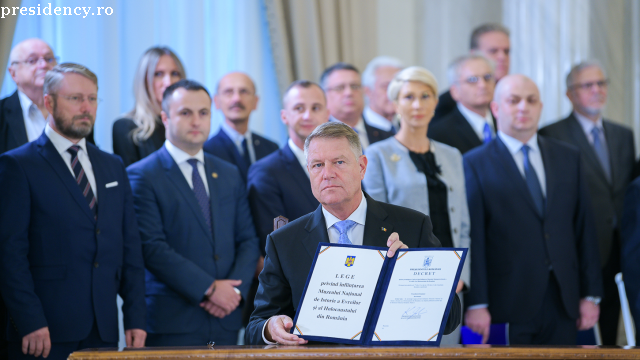The Museum of Jewish and Holocaust History
President Klaus Iohannis has signed the decree for the creation of the National Museum of History of the Jewish People and the Holocaust in Romania

Mihai Pelin, 09.10.2019, 13:55
Every year on October 9 Romania pays homage to the victims of the Holocaust in
Romania. The date bares an important significance, because on this day in 1941
the deportation of Jews from Romania was started. This dark chapter of our
country’s history preceded the legionnaire pogrom of January 1941 in Bucharest,
and the one in Iasi in June later that year. Nearly 80 years on, President
Klaus Iohannis has given the go-ahead for the creation of the first National
Museum of History of the Jewish People and the Holocaust. The venue will be an
8,000 square-meter eight-storey building dating from the inter-war period at
the heart of Bucharest, on Victory Road. The funding will be ensured by the
state, via the Elie Wiesel National Institute for Holocaust Studies, as well
as other donations and sponsorships. President Iohannis said this museum should
be a symbol of solidarity against intolerance, anti-Semitism and
discrimination. He pointed out that Jewish heritage is representative of
national culture, which is why the National Museum of History of the Jewish
People and the Holocaust will be tasked with capitalizing on this heritage. The
president also believes this is a project that will bring people closer
together.
By building this museum, Romania
strongly fosters the history, legacy and culture of those who have contributed
to the creation of our nation. You all agree the museum should be an
institution of the future, an ally of education against ignorance, a fortress
of solidarity and civic patriotism in the face of intolerance, anti-Semitism
and discrimination.
In turn, Prime Minister Viorica
Dancila pointed out she has closely supported this initiative, arguing no
effort is too great in order to combat any kind of prejudice fuelling
anti-Semitism, racism, intolerance, xenophobia and discrimination. An
international commission headed by Nobel laureate Elie Wiesel concluded in 2004
that between 280,000 and 380,000 Romanian and Ukrainian Jews were killed in
Romania and areas it controlled during the war, as an ally of Nazi Germany.
Romania switched sides in the war in 1944 when the Red Army assaulted the
Balkans. The communist regime that took the power did little to reveal the
horrors of the Holocaust. Romania has only recently started to come to terms
with its role in the extermination of Jews, admitting for the first time in
2003 that it had taken part. The new museum aims to promote the history,
culture and traditions of Jews in the country and highlight their contribution
to modernizing Romanian society.
(Translated by V. Palcu)






























